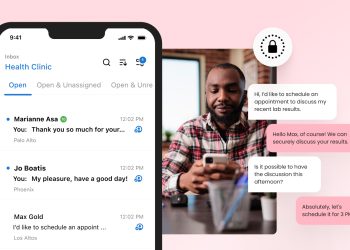In today’s fast-paced world, businesses constantly seek innovative ways to provide efficient and effective customer service. With the prevalence of mobile devices, SMS texting and messaging have emerged as powerful tools to connect with customers conveniently and personally.
Let’s explore the benefits and best practices of using SMS texting and messaging for customer service, also known as text or SMS customer service. Businesses can leverage these platforms to enhance customer support, improve communication, and create memorable customer experiences.
Instant and Convenient Communication
One of the critical advantages of text customer service is the ability to communicate with customers in real time. With SMS texting and messaging, businesses can quickly address customer inquiries, provide immediate assistance, and resolve issues promptly. Customers appreciate the convenience of sending a text message and receiving a timely response, making it a preferred communication channel for many.
Personalized and Engaging Interactions
SMS texting and messaging enable businesses to establish a more personal and engaging connection with their customers. Businesses can create a sense of familiarity and build stronger relationships by addressing customers by their names and utilizing a conversational tone. Additionally, businesses can leverage customer data to tailor messages by sending personalized offers, order updates, or relevant recommendations, increasing customer satisfaction and loyalty.
24/7 Availability
SMS customer service allows businesses to offer round-the-clock support. Automated messages or chatbots can handle basic inquiries and provide immediate responses outside regular business hours. This ensures that customers receive assistance and information whenever needed, enhancing their overall experience and minimizing frustration.
Efficient Issue Resolution
Text messaging customer service allows businesses to streamline issue resolution processes. Customers can provide detailed information about their concerns or problems through text, enabling support agents to understand the issue quickly and provide targeted solutions. This eliminates the need for lengthy phone calls or back-and-forth emails, saving customers and support teams time.
Order Updates and Reminders
SMS messaging effectively provides customers with order updates, delivery notifications, and appointment reminders. Businesses can send automated text messages to keep customers informed about the status of their orders, delivery schedules, or upcoming appointments. This proactive approach improves customer satisfaction, reduces missed appointments, and ensures a smooth customer journey.
Best Practices for SMS Customer Service
Obtain Customer Consent
Ensure that customers have explicitly opted in to receive text messages from your business. Respect their privacy and provide clear instructions on opt-out if they wish to unsubscribe.
Keep Messages Concise
Due to the limited character count of text messages, keeping your messages concise and to the point is essential. Focus on providing relevant information while maintaining clarity.
Use Templates
Develop a library of pre-approved templates for common customer inquiries or scenarios. This lets your support team respond quickly and consistently, ensuring a seamless customer experience.
Personalize Messages
Whenever possible, personalize your messages to make customers feel valued and recognized. Incorporate their names, reference previous interactions, or tailor the content based on their preferences or purchase history.
Be Responsive
Respond to customer inquiries as promptly as possible. Aim for quick turnaround times and set clear expectations regarding response times. If necessary, use automated messages to acknowledge receipt and inform customers about the next steps.
Train Support Agents
Provide thorough training to your support team on using SMS customer service. Ensure they are familiar with best practices, tone of voice, and how to handle different types of customer inquiries effectively.
Optimize Efficiency with Automation
Automation plays a vital role in SMS customer service. Businesses can use chatbots or automated response systems to handle common inquiries, provide quick answers to frequently asked questions, and direct customers to relevant resources. This improves response time and allows support agents to focus on more complex or personalized customer interactions, maximizing efficiency and productivity.
Promote Proactive Communication
SMS messaging enables businesses to approach customer service proactively. Beyond responding to customer inquiries, businesses can use SMS to send proactive notifications or updates. For example, businesses can notify customers about product launches, upcoming sales, or service disruptions. This proactive communication keeps customers informed and engaged, fostering a sense of transparency and reliability.
Gather Feedback and Conduct Surveys
SMS customer service can effectively gather feedback and conduct surveys. After resolving an issue or completing a transaction, businesses can send a follow-up SMS to customers, asking them to rate their experience or provide feedback. Short, targeted surveys can help businesses collect valuable insights, identify areas for improvement, and measure customer satisfaction levels.
Integrate SMS with Omnichannel Support
To provide a seamless customer experience, businesses should integrate SMS customer service with their omnichannel support strategy. Customers may prefer different channels depending on their needs or preferences. By integrating SMS with other support channels such as email, live chat, or phone support, businesses can offer customers the flexibility to choose their preferred method of communication.
Ensure Data Security and Compliance
Businesses must prioritize data security and compliance when implementing SMS customer service. Ensure that customer data is handled securely and adhere to data protection regulations. Obtain customer consent for sending SMS messages and allow customers to easily opt-out if they no longer wish to receive communications. Businesses can build trust and maintain a positive reputation by focusing on privacy and compliance.
Continuously Improve and Adapt
As with any customer service strategy, it’s crucial to continuously monitor, analyze, and improve your SMS customer service efforts. Monitor customer feedback, track response times, and measure customer satisfaction metrics. Use these insights to identify areas for improvement and make necessary adjustments to your processes and messaging. Customer expectations evolve, so staying agile and adapting to their needs is crucial for long-term success.
SMS texting and messaging offer businesses a powerful channel for providing exceptional customer service. With instant communication, personalized interactions, and 24/7 availability, businesses can enhance customer satisfaction, improve issue resolution, and build lasting relationships. By following best practices and leveraging the benefits of text customer service, businesses can elevate their customer support efforts and create memorable experiences that set them apart from the competition.
Embrace SMS customer service as a valuable tool in your customer service strategy, and watch your customer satisfaction and loyalty soar. Discover more about our texting service.














